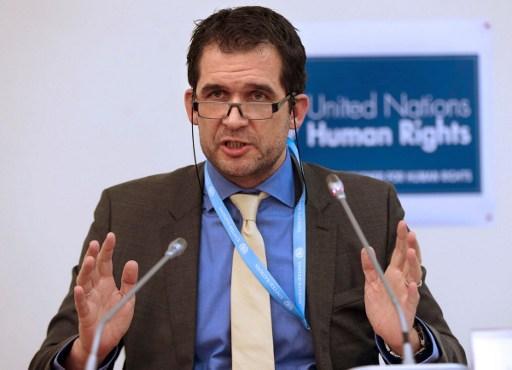United Nations Special Rapporteur on Torture Nils Melzer during a press conference in Ankara on Friday talked about an environment conducive to torture following a failed coup in Turkey on July 15.
“Some recently passed legislation and statutory decrees created an environment conducive to torture,” Melzer told reporters amid growing complaints and reports about the existence of systematic torture in Turkey’s prisons. The country has been under a state of emergency, extended for three months in October, after the botched coup of July 15.
In a comment critical of the government, he later told The Associated Press that Turkey is not following up on investigating torture allegations. Although the government denies such claims, Turkey’s prisons are not subject to independent monitoring.
Melzer’s visit, the first by a UN torture expert to Turkey since 1998, comes a month after US-based watchdog Human Rights Watch (HRW) accused Turkish police of torturing detainees. On Oct. 27, in a 43-page report titled “A Blank Check: Turkey’s Post-Coup Suspension of Safeguards Against Torture,” HRW documented 13 specific abuse incidents concerning Turkey’s post-coup detainees. The alleged abuse cases ranged from the use of stress positions and sleep deprivation to severe beatings, sexual abuse and the threat of rape.
HRW said it had interviewed more than 40 lawyers, human rights activists, former detainees, medical personnel and forensic specialists before preparing the report. The watchdog said Turkey’s post-coup emergency decrees facilitated torture as they removed safeguards against ill treatment.
Human rights group Amnesty International reported on July 24 that it had received credible evidence of detainees in Turkey being subjected to beatings and torture, including rape, since a failed coup on July 15.
In a similar statement in September a member of Turkey’s Human Rights Association (İHD), lawyer Gülseren Yoleri, said there is torture in Turkey’s detention centers and that torture devices that were used during coup periods in the past have been put to use again during emergency rule.
In September the Turkish government postponed the scheduled visit of Juan E. Mendez, the UN special rapporteur on torture, to the county, which has been beset by allegations of torture, maltreatment and rape against detainees in the aftermath of the failed coup attempt.
The postponement came just weeks after Turkey’s National Police Department was accused of having removed evidence of torture and ill treatment of post-coup detainees prior to the official visit of a delegation from the Committee for the Prevention of Torture (CPT).
In a classified letter widely circulated in media outlets, the acting deputy head of the Turkish National Police warned all officers about the visit and ordered them to avoid using sports facilities as detention centers during the delegation’s stay in the country.
The official also asked police officers to obey international rules of detention while the delegation was in Turkey and ordered them to reorganize all detention centers and to make the centers ready for the inspection as soon as possible.
Confirming the claims, Selçuk Kozağaçlı, the president of the Progressive Lawyers’ Association (ÇHD), said during the Ankara Bar Association’s general assembly on Oct. 16 that people imprisoned as part of a government crackdown on the Gülen movement are being systematically tortured in the most barbaric ways including rape, removal of nails and the insertion of objects into their anuses.
“They remove the nails of colleagues [during detention] at police stations. Believe me, I saw people who underwent a colostomy after they were tortured with objects inserted into their anuses in prison and police stations,” said Kozağaçlı.
The İHD said in a report on Oct. 21 that there are nearly 220,000 people in Turkey’s prisons, which is more than 20 percent above the 183,000-person capacity.
According to the İHD report, Turkish prisons rapidly became overwhelmed by detentions and arrests that followed the failed coup in Turkey on July 15.
More than 70,000 people have been detained and 35,000 jailed as part of the witch-hunt against the Gülen movement following the coup attempt.



